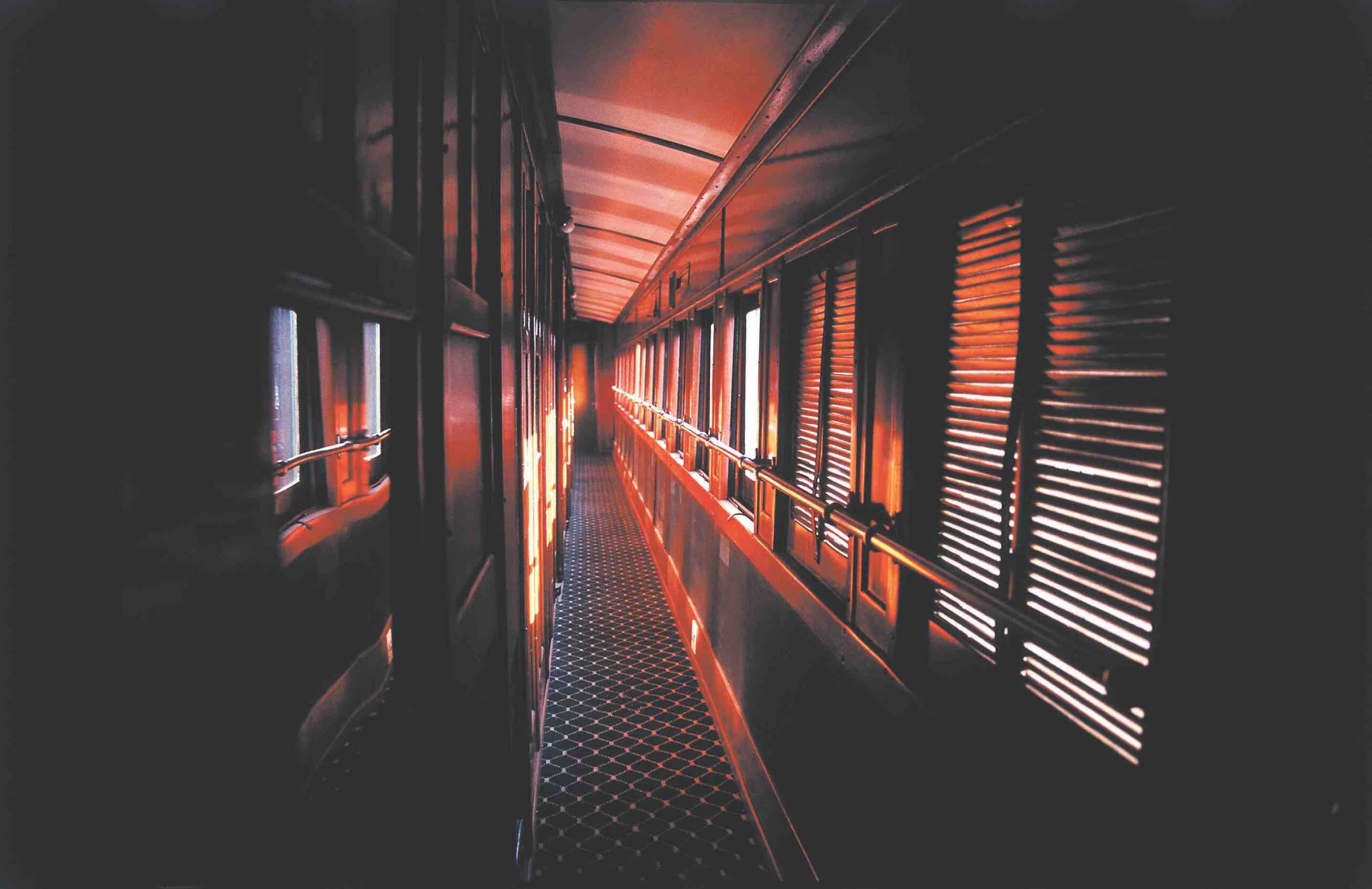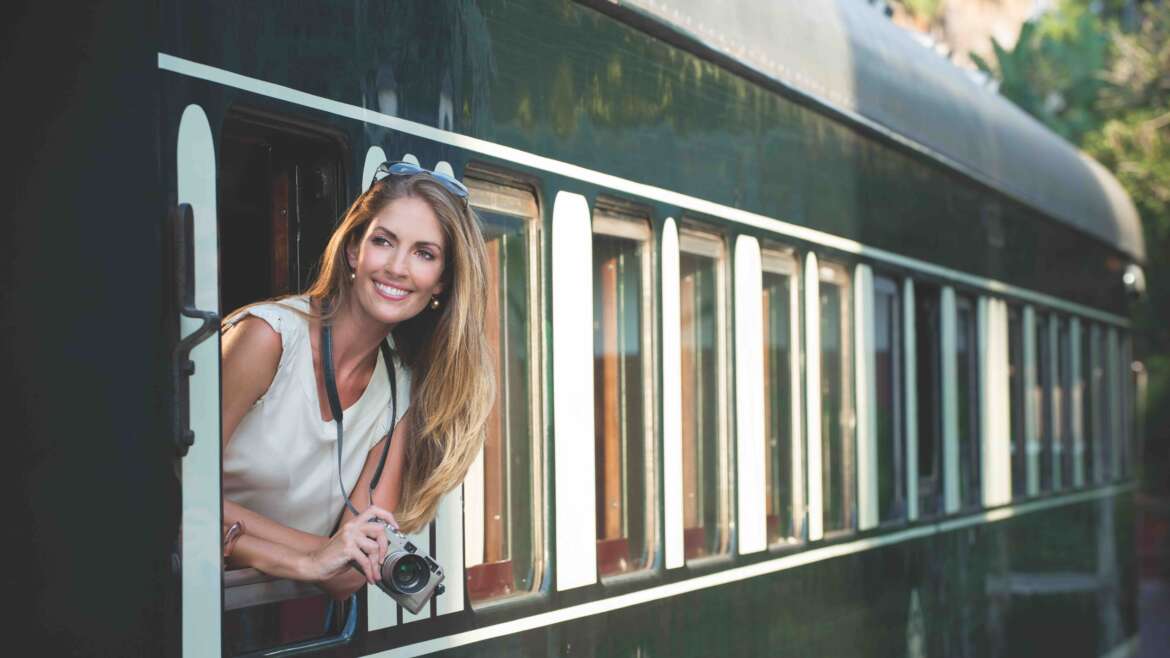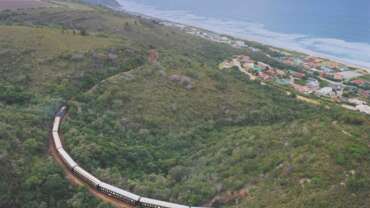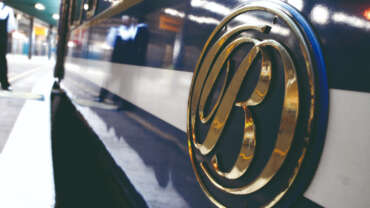WELCOME ABOARD THE ROVOS RAIL
Since its establishment in 1989, Rovos Rail has earned an international reputation for its truly world-class travel experiences. In a series of bespoke train journeys lasting from 48 hours to 15 days, Rovos Rail links some of the continent’s greatest destinations with a variety of off-train excursions.
Step aboard the vintage wood-panelled coaches and sit back as some of the most varied scenery imaginable unfolds beyond the windows. With discreet and friendly service, top cuisine and a selection of South Africa’s finest wines, Rovos Rail harks back to a simpler, more elegant era encompassing the timeless grace and high romance of African exploration.
The beautifully rebuilt trains, which may be hauled by diesel or electric locomotives, carry a maximum of 72 passengers in 36 superbly appointed suites and are also available for charter, while the Events Train caters for up to 250 guests and is suitable for daytime journeys.
The Rovos Rail History
As so often happens, it was a combination of influences and events that led to the purchase of the first coach, the start of what would become Rovos Rail. A Wilbur Smith heroine with her own private railway coach, a man called Phil Acutt with a passion for trains and the presence of the Witbank Steam Railway in the coal-mining town where Rohan Vos ran his successful auto spares business, all played a part.
“Rohan has always been obsessed with things mechanical,” remembers Anthea Vos, who has been at his side throughout and has raised a family in and around developing the railway business. “In fact, he started his first business with the capital derived from the sale of a 1940 Packard and a 1928 Austin that he had rebuilt. Rohan was involved in so many ventures, but I didn’t see this one coming.”
In 1985, Rohan and Anthea took up a last-minute invitation on a Magaliesberg train trip for business suppliers. “I became a train widow on that day,” says Anthea. “I sat all dressed up by myself; Rohan spent most of the time in the engine with the driver. The irony was that we should have seen then how difficult it would be – the train broke down and we were bussed back to town.”
The same year, influenced by his friend Phil Acutt’s love of trains and the work done by the Railway Preservation Society in Witbank, Rohan attended an auction to buy a coach or two – the intention was to restore four carriages and hitch them to a South African Railways train as a family caravan. Steam-train enthusiast, Geoff Pethick, was present at the auction and assisted him. “It was the 26th of September – a cold day with rain in the air – and I’d hoped Rohan wasn’t another penniless lunatic with grand ideas,” he recalls. “As we chatted, I quickly realised that here was a man of vision.”
Several coaches were purchased and taken to the Society’s yards in Witbank to be rebuilt. One of them, Private Saloon 15063, is still in service and another, an engineer’s caboose, stood at Cape Town’s V&A Waterfront for many years where it served as the marketing and reservations office. The complications of working with the South African Transport Services administration soon convinced Rohan that he needed to be self-sufficient where possible. As a result, he purchased a 1938 Class 19D locomotive from Lowenthal’s Scrap Metal in Johannesburg. It was rebuilt by Rovos Rail and named BIANCA after one of his daughters.
Negotiations began with Sam Taute of SAR and Rohan was granted permission to run his train in December 1986. This was when the idea of running a vintage train as a business venture was born. The tariff quoted by the authorities for hauling the train was, however, extremely high and would have made the “family caravan” an extravagant exercise.
After his objection to the charge, the Railways returned a well thought-out curve ball, giving Rohan the right to sell tickets. “I remember the occasion very clearly: on a wintry evening I was subsiding into a hot bath with my Red Heart Rum and coke close at hand. There’d been a power cut, so musing by candlelight about the consequences of turning a hobby into a business, I let my imagination float around in delusions of grandeur. But I knew that launching into the arena of tourism and trains, of which I had no experience, held many dangers. It was an uncharted course and I had little idea where to start, let alone where to aim. However, a unique challenge was right up my street and the decision was made to go ahead. This was – unknown to me at the time – a life-changing moment and sadly, during the next few years or so, I had many agonising thoughts regretting the move. I could never have imagined how all-consuming the business was to become both financially and emotionally.
“Consisting of a locomotive and seven carriages, the train was launched on 29 April 1989, and with four paying passengers, friends and press we set off for the Eastern Transvaal. So, with a four-night Lowveld experience and in 1991 the Pretoria to Cape Town run, the business began to find direction. But, as any train operator or airline will confirm, running a schedule is risky and nerve-wracking. To project consistency and reliability to agents and passengers, it’s imperative to run according to the advertised schedule. Of course, this wears rather thin when passenger loads are less than the number required to break even financially. I found to my horror that one can lose considerably more money establishing a schedule and consequently a reputation than it might cost to buy or construct the hardware.
“To finance this one-way street, I had sold various cash-generating businesses in and around Witbank, mostly to my management partners. Just prior to the train launch, I sold my Witbank and Secunda spares businesses to a public company. I accepted shares for this transaction and these were lodged with the bank as security for the overdraft to finance the train operation. Then, surprise surprise, the public company went insolvent and my shares were valueless. My bankers, of course, were not amused.
“So, with the first democratic elections coming in 1994 and confidence in the business future of South Africa tumbling to an all-time low, they put pressure on me to repay the overdraft. Although I was of the opinion that they were well enough secured and that I could service the account, they were not interested and proceeded to summons me for the outstanding amount in late 1993. The operation was close to break-even at this time, but nobody was interested in investing in the business and I had exhausted every possible avenue of financial assistance.
“Visiting the London World Travel Market during this trying time, I met tour operator Philip Morrell, owner of Jules Verne in London. Between us, we hatched a plan to run the train from Cape Town to Victoria Falls. The package was advertised in the Sunday Telegraph during late December and it was with trepidation that I answered the call from him soon after Christmas. To my relief, he reported that sales were going extremely well and nearly four train loads had been booked. My answer, after a suitably stunned silence, was ‘send cash’.
“And so, bankruptcy was avoided by a nose, and to illustrate the turnaround it was in fact a year later that I purchased 38 redundant carriages from the South African Railways. Since then we have never looked back, although the scars of battle are always there reminding me never to relax.”
Armed with Les Pivnic’s book on dining cars, Rohan started the search for suitable coaches. An early target was the Jewish Guild Country Club in Johannesburg where three vandalised and dilapidated dining cars stood as part of an aborted restaurant venture. All three – KEI, NILE and MODDER – were hauled to Witbank and returned to the rails. In the years since then, family life has been inseparable from the business with Rovos Rail growing up alongside the Vos children. Family holidays always had another agenda as they scoured the far ends of the country for coaches and locomotives to add to their collection.
All the engines acquired for Rovos Rail have been named after the Vos children – Brenda, Bianca, Tiffany and Shaun – and nothing could be more appropriate as the family’s history and memories are so tightly interwoven with the Rovos Rail story of acquisition and expansion. On the 10th anniversary of Rovos Rail, the magnificently restored and rebuilt locomotive – 25NC 3484, which had been converted from coal-firing to oil – was christened MARJORIE by Rohan’s mother, Mrs Marjorie Vos.
Before the first commercial trip, Joy Strydom joined Rovos Rail as its first employee in May 1988 and is still with the company. “Rohan called me out of the blue and we met at a Cape Town restaurant with a railway coach bar. Rohan spent most of the time checking it out to see what had been removed and which features remained. The romance of the railway project – and his enthusiasm – had me hooked.”
Through two decades of hard work, trying times, bankers and accountants (who were by turns sympathetic and sceptical), the birth of a new democracy and a tourism surge, there’s been a special magic about Rovos Rail. “Many of us in those early years didn’t believe that Rohan would ever achieve what he’d set out to do,” says Pethick. “It’s wonderful to see that, despite ups and downs, Rovos Rail is doing well and has helped preserve much of our railway history.”
Charters & Events
JOURNEY CHARTERS
In a series of journeys lasting from 48 hours to 15 days, Rovos Rail links some of Africa’s greatest destinations. The beautifully rebuilt trains – which may be hauled by diesel or electric locomotives – carry a maximum of 72 passengers in 36 superbly appointed suites and are available for charter on any scheduled journey.
CHARTER TRAIN PACKAGES
There are many itinerary options combining our 42- or 72-bed train with other entertaining products for bespoke charters including incentive groups, historical expeditions, cycling tours and private gatherings. We are happy to advise clients of these options to help construct exciting and practical itineraries to suit the available time and budget.
The EVENTS TRAIN
It is a perfect venue for weddings, private gatherings, incentives, conferences and product launches accommodating up to 250 guests. Limited only by time and distance, there are many alternative uses for the train, which include a three-hour circular trip around Pretoria or a one-way journey to any destination within eight hours’ rail travel time from Pretoria. Only suitable for day trips and depending on the number of guests, the Events Train can host – with full bar facilities – a four-course sit-down lunch or dinner for up to 120 guests OR for up to 250 guests, canapés served for the duration of the journey.
The Events Train is also an ideal venue for WEDDING couples looking for something old-world, enchanting and romantic. Depending on the number of guests, it can host – with full bar facilities – a four-course sit-down lunch or dinner for up to 120 guests for the duration of the three-hour journey. Guests are greeted at our private station in Pretoria by a sparkling wine reception before the bride makes a grand entrance in the cab of a steam locomotive. After the ceremony in the charming Edwardian station, guests step on board to enjoy five-star hospitality and the gentle rocking of the train as it winds its way through Jacaranda City.
Life on Board
Each train has accommodation carriages, dining cars (±42 seats), a lounge car (±26 seats), small gift shop, smoking lounge (±11 seats) and observation car (±32 seats) with open-air balcony. Maintaining the spirit of a bygone era, there are no radios or television sets on board. The three types of suites available – Pullman (7sqm), Deluxe (10sqm) and Royal (16sqm) – offer passengers privacy and comfort with double or twin beds and fittings and facilities that are of the highest standard.
All have en-suites with shower, toilet, basin and bath (Royal only), tea facilities, safes, air conditioning, linen and amenities and are serviced daily. There is adequate storage and small cupboards with hangers and shelves. Please see Public Cars and Suites for more details.
We welcome all travellers – singles, couples and groups. The dining cars are made up of two-seaters and four-seaters where guests eat together or individually. Our lounge and observation cars – with their big picture windows, sofas and booths – make for great mingling areas or quiet corners to while away the days.
Many of our passengers enjoy the formality of fine china and glassware, crisp linen and silver, and dress accordingly. Days on board are smart casual while evening attire is more formal. On long journeys we enjoy themed evenings where guests can dress up accordingly or opt for smart casual.
An enthusiastic team of chefs is responsible for overseeing the very important task of ensuring guests’ every need is catered for. There’s an accent on fresh local ingredients and traditional dishes are a specialty. Meals are served in one sitting only in the dining cars and are complemented by a selection of fine South African wines. Our bar menu is comprehensive although special items such as French Champagne would need to be requested in advance. Breakfast: 07:00-10:00 • Lunch: 13:00 • Tea: 16:30 • Formal Dinner: 19:30. Bar service is from 07:00-±01:00. All meals are served at these times unless otherwise stated in the itineraries.
Rovos Rail Station
For Rovos Rail passengers, a highlight of their journey is a visit to the private station at Capital Park, Pretoria. The once-bustling hub of steam locomotion is now the headquarters for Rovos Rail. The gracious railway station serves as the departure or arrival point for most of the train journeys.
The property boasts an ever-expanding railway museum – showing a historical collection of train paraphernalia – in addition to its other comprehensive facilities and will, with the addition of semaphore signals and a footbridge, recreate the atmosphere of a fully-fledged railway system. It is intended that, with time, this facility should become the foremost working train museum in the world.
The eyes of rail enthusiasts will be drawn to the vast carriage and locomotive sheds where teams of dedicated personnel keep the rolling stock in perfect order. This roofed workshop of 10 000m2 straddles 15 railway lines with concrete inspection pits below, and is the ultimate repair and maintenance facility for any train operation. The low, red-bricked buildings alongside the new 300m platform house laundries, gleaming stainless-steel kitchens and well-stocked storerooms. This is the busy hub of a provisioning operation that is world-class in terms of efficiency and attention to detail.
STATION TOUR & MUSEUM: Should you wish to visit our museum or do a site tour, which will show you the nuts and bolts of the company, we suggest arriving two hours prior to departure. If Pretoria is your arrival point, we suggest delaying your pick-up so you can enjoy the tour.

OBSERVATION CARS
The observation car seats ±32 passengers. With its open-air balcony, big picture windows, bar, sofas and booths, it has great mingling areas or quiet corners to while away the days. On most days, afternoon tea is served at 16:30 in the lounge and observation cars while bar service is from ±07:00-01:00.
LOUNGE CARS
The lounge car seats ±26 passengers. With its big picture windows, sofas and wingbacks, it has great mingling areas or quiet corners to while away the days. On most days, afternoon tea is served at 16:30 in the lounge and observation cars while bar service is from ±07:00-01:00. On some of our long journeys, we have an onboard historian who hosts lectures in the lounge car. At one end of the carriage there is a small gift shop, which is a smart, subtly-lit glass affair selling bespoke memorabilia.
DINING CARS
The dining cars seat ±42 passengers each. Dependent on the number of passengers on a journey, the train is setup with one or two dining cars. They are made up of two-seaters and four-seaters where guests eat together or individually. Meals are served in one sitting only. Breakfast: 07:00-10:00 • Lunch: 13:00 • Formal Dinner: 19:30. All meals are served at these times unless otherwise stated in the itinerary. Hot breakfast items are made to order while lunch and dinner are four-course meals complemented by fine South African wines. Our bar menu is comprehensive although special items such as French Champagne would need to be requested in advance.
CLUB CARS
The Club Car area was created by demolishing the end suite in a Deluxe carriage. This was done specifically to host the smokers on the train in a public area and also as an overflow facility adjoining the Observation Car. With a glass passage wall, guests can comfortably watch the scenery on both sides of the train.
GIFT SHOP
There is a small gift shop on the train in the lounge car and at Rovos Rail Station in Pretoria. The collection of bespoke merchandise and timeless mementos have been specially procured and produced for Rovos Rail.
ABOUT
Vintage carriages combine with modern luxuries in 3 suite types available in double or twin: Royal ±16m2, Deluxe ±10m2 and Pullman ±7m2.
The wood-panelled sleeper coaches, remodelled and refurbished to mint condition, offer every modern convenience and comfort with fittings and facilities that are of the highest standard. The suites accommodate one or two passengers with the option of double or twin beds. All have en-suites with shower, toilet, basin and bath (Royal only), tea facilities, safes, air conditioning, linen and amenities and are serviced daily. There is adequate storage and small cupboards with hangers and shelves.
ROYAL
The Royal Suites each take up half a carriage with their own private lounge area and en-suite bathroom with Victorian bath, separate shower, toilet and basin. They accommodate one or two passengers in double or twin beds. A dedicated host/ess is available at all times and services the suites daily. A bar fridge is filled with the on-board beverages of the passengers’ choice.
• Double or twin beds • En-suite with bath, shower, toilet and basin • Small lounge area • Writing desk • Luggage shelf • Cupboards • Safe • Air conditioning • Fridge • Tea facilities • Bespoke amenities • Robes and slippers • Hairdryer (fixed or plug-in) • Shaver plugs (2-pin) • USB ports • Safety glasses • Emergency torch • Fire extinguisher • Laundry bag • Shoe bag • Internal telephone system • Room service
DELUXE
The Deluxe Suites accommodate one or two passengers in double or twin beds and have their own lounge area and en-suite bathroom with shower, toilet and basin. A dedicated host/ess is available at all times and services the suites daily. A bar fridge is filled with the on-board beverages of the passengers’ choice.
• Double or twin beds • En-suite with shower, toilet and basin • Small lounge area • Writing desk • Luggage shelf • Cupboards • Safe • Air conditioning • Fridge • Tea facilities • Bespoke amenities • Robes and slippers • Hairdryer (fixed or plug-in) • Shaver plugs (2-pin) • USB ports • Safety glasses • Emergency torch • Fire extinguisher • Laundry bag • Shoe bag • Internal telephone system • Room service
PULLMAN
The Pullmans, used on our short journeys, accommodate one or two passengers and have an en-suite bathroom with shower, toilet and basin. During the day, the suites have a comfortable sofa-seat with a conversion to double or twin beds (side-by-side or upper and lower bunks) for the evening. A dedicated host/ess is available at all times and services the suites daily. Please note in the animation that we indicate a bar fridge, however, these have been removed from the Pullmans.
• Double or twin beds • Upper and/or lower bunk • Daytime sofa setting • En-suite with shower, toilet and basin • Fold-up writing desk • Luggage shelf • Cupboards • Safe • Air conditioning • Tea facilities • Bespoke amenities • Robes and slippers • Hairdryer (fixed or plug-in) • Shaver plugs (2-pin) • USB ports • Safety glasses • Emergency torch • Fire extinguisher • Laundry bag • Shoe bag • Internal telephone system • Room service
PULLMAN GOLD
The Pullman Golds, used on our long journeys, accommodate one or two passengers and have an en-suite bathroom with shower, toilet and basin. During the day, the suites are setup with split twin beds configured as sofa-seats (optional) with a conversion to split twin or double beds for the evening. A dedicated host/ess is available at all times and services the suites daily.
• Double or twin beds • Daytime sofa setting • En-suite with shower, toilet and basin • Fold-up writing desk • Luggage shelf • Cupboards • Safe • Air conditioning • Tea facilities • Bespoke amenities • Robes and slippers • Hairdryer (fixed or plug-in) • Shaver plugs (2-pin) • USB ports • Safety glasses • Emergency torch • Fire extinguisher • Laundry bag • Shoe bag • Internal telephone system • Room service





